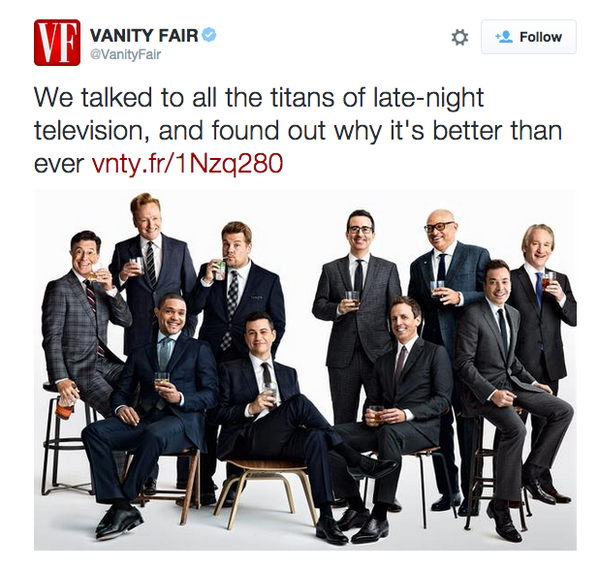Just Some Dudes Hanging Out, Drinking to Male Privilege

We talked to all the titans of late-night television, and found out why it’s better than ever http://t.co/pIG1c7wSs1 pic.twitter.com/p8EgyB5jva
— VANITY FAIR (@VanityFair) September 14, 2015
Vanity Fair just accidentally illustrated comedy and TV’s “boys’ club” problem better than any article ever could.
Earlier today VF shared the above tweet to promote their article “Why late Night Television Is Better Than Ever,” and although the article itself addresses the lack of women in late night TV institutions, that image (coupled with the tweet’s wording) is an excellent representation of clueless male privilege.
Again, Vanity Fair’s David Kamp spends a significant portion of his article condemning the overwhelming straight-white-maleness of late night, but it is telling that Vanity Fair felt comfortable publishing some bullshit like this with the caption “television is better than ever” (Twitter user @blkMYmorris points out that there are literally more men named “Jimmy/James” in this pic than there are black men).
The conversation about representation in media is more important than ever before. How did someone influential at Vanity Fair not say “hang on, let’s at least get some female writers in there, too”?
The article itself explains,
What’s conspicuously missing from late-night, still, is women. How gobsmackingly insane is it that no TV network has had the common sense—and that’s all we’re talking about in 2015, not courage, bravery, or even decency—to hand over the reins of an existing late-night comedy program to a female person? While Amy Schumer has acknowledged that she turned down The Daily Show, happy where she is at Comedy Central, that doesn’t mitigate the fact that Chelsea Peretti, Megan Amram, and Jen Kirkman, to name but three contenders, are alive, sentient, funny, and presumably open to taking a meeting. (And how great would Lea DeLaria be as an M.C., going places Ed McMahon never dared to go? It’d be weird, wild stuff.)
Fortunately, comedic redress is on its way, in the form of two new shows created from scratch, Samantha Bee’s for TBS and Chelsea Handler’s for Netflix. (Both shows are due in 2016.) Two female hosts plus the 10 men featured here is still a long way from a late-night that truly looks like America. But the next version of this story’s opening picture will be that much brighter.
Lack of representation doesn’t stop with the host position, of course. Although late night writing teams have diversified drastically in recent years, there’s still lots of progress to be made; Colbert has promised to “celebrate the voices of women” in his Late Show position, but as of now only two of the nineteen writers on his team are female (and all are white).
In his article, Kamp writes of recent retirements in late night that “given the circumstances, change is good, even if it comes at a disorienting pace.” I couldn’t agree more.
Faster change is needed for cultural institutions like late night TV, although the pace necessary to get to a place of parity soon will definitely be disorienting for people who benefit from the current status quo. But you shouldn’t be able to publish a picture like this one anymore without getting flak for it; and if your writer’s room has the gender ratio of an Avengers DVD case, you should hear about that, too.
It might be “confusing” for establishments to accept that late night as it once was is no longer acceptable, but change like that is good. No matter how disorienting.
There is one silver lining to all this, mind: Samantha Centaur Bee.
.@VanityFair BETTER pic.twitter.com/EfPbTQ3qZ8
— Samantha Bee (@iamsambee) September 14, 2015
—Please make note of The Mary Sue’s general comment policy.—
Do you follow The Mary Sue on Twitter, Facebook, Tumblr, Pinterest, & Google +?
Have a tip we should know? [email protected]